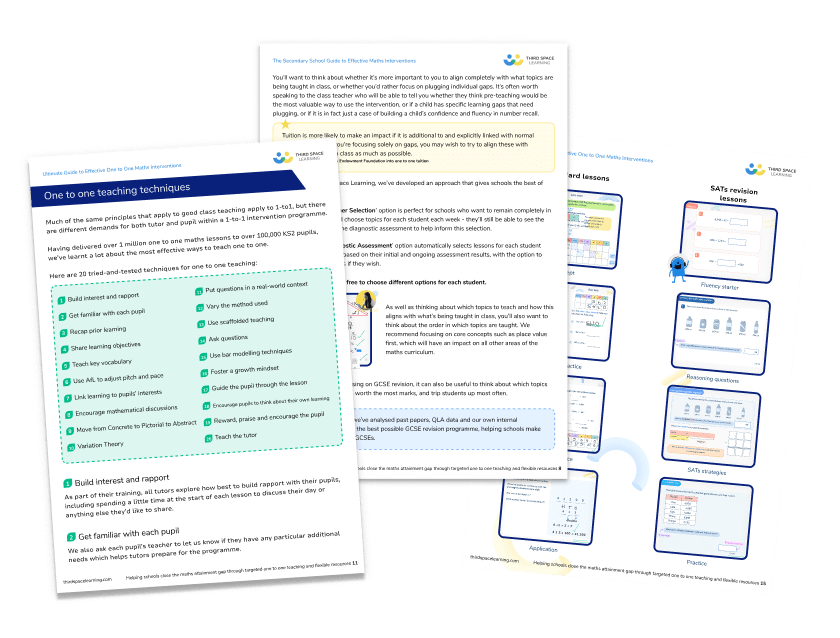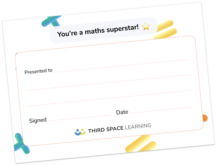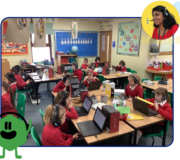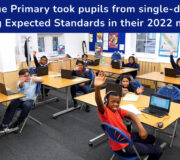Effective Praise In The Classroom: What Works & What Doesn’t [FREE Praise Certificate]
We all know that giving out praise in the classroom is an effective way to boost confidence and keep pupils motivated in their learning.
Originally published 16th June 2022
Since this blog was published, Third Space Learning has transitioned to AI maths tutoring with Skye, the AI tutor, but has nevertheless embedded its learnings into the new platform.
Pupils need to feel rewarded for the time and effort they put into their maths learning, and, while tangible rewards can be a great motivator, praising strategies are often just as (if not more) effective!
This has always been a big part of the way we teach here at Third Space Learning. How we praise pupils is top of our list when we’re looking at making our online one-to-one programmes as powerful as possible.
That’s why this year we’re giving the way we praise pupils a complete overhaul.
Want to find out more, or talk to one of our friendly team?
Just tell us the number of pupils you’re planning to support, and we’ll get in touch with a personalised quote and more information about how it works.
A job well done? Learning from praise in action
Since 2013, over 115,000 pupils have received personalised online maths tuition from our community of tutors – that’s nearly 1.5 million one-to-one sessions!
We regularly analyse our sessions to understand what kind of praise elicits the best response from pupils and find out what we could be doing even better to boost progress and confidence in our Third Space Learners.
Read on if you’re interested in…
- Everything we’ve learnt about effective praise in maths;
- The changes we’ve made to our approach to praise;
- What you can do in your own classroom to ensure your praise is effective;
- Listening to a real-life example of how specific praise can motivate pupils.
We’ve even included a free downloadable certificate for you to use in your classroom!
Printable Maths Superstar Certificate
Download this free maths certificate to reward your maths students for all of their hard work this term!
Download Free Now!1. Praise is important for overcoming maths anxiety and building engagement
With maths (more than any other subject), pupils can often feel anxious and that they ‘just don’t get it’. For a lot of pupils, this can cause them to switch off, and to feel like there’s ‘no point’ even trying. That’s why it’s essential that pupils feel rewarded when they put time and effort into building their maths skills.
If a pupil turns up to their maths lesson but doesn’t receive any praise throughout the class, they might be reluctant to attend the next one, and if they do, they may not be motivated to try.
If they receive regular praise from their teacher or tutor for the effort and progress they’re making, they’re likely to feel more invested in their learning journey, and feel much more confident and engaged in the future. Even better, they’ll start to feel proud of the progress they’re making and be excited to make even more.
Fostering an environment where pupils are praised regularly in your own classroom can help those who potentially lack the confidence to participate and overcome their fears, engaging a little more than they might have otherwise. Note anyone who may need some extra encouragement and be sure to praise them for the effort they put into their maths lessons – even if they’re a bit reluctant to do so!
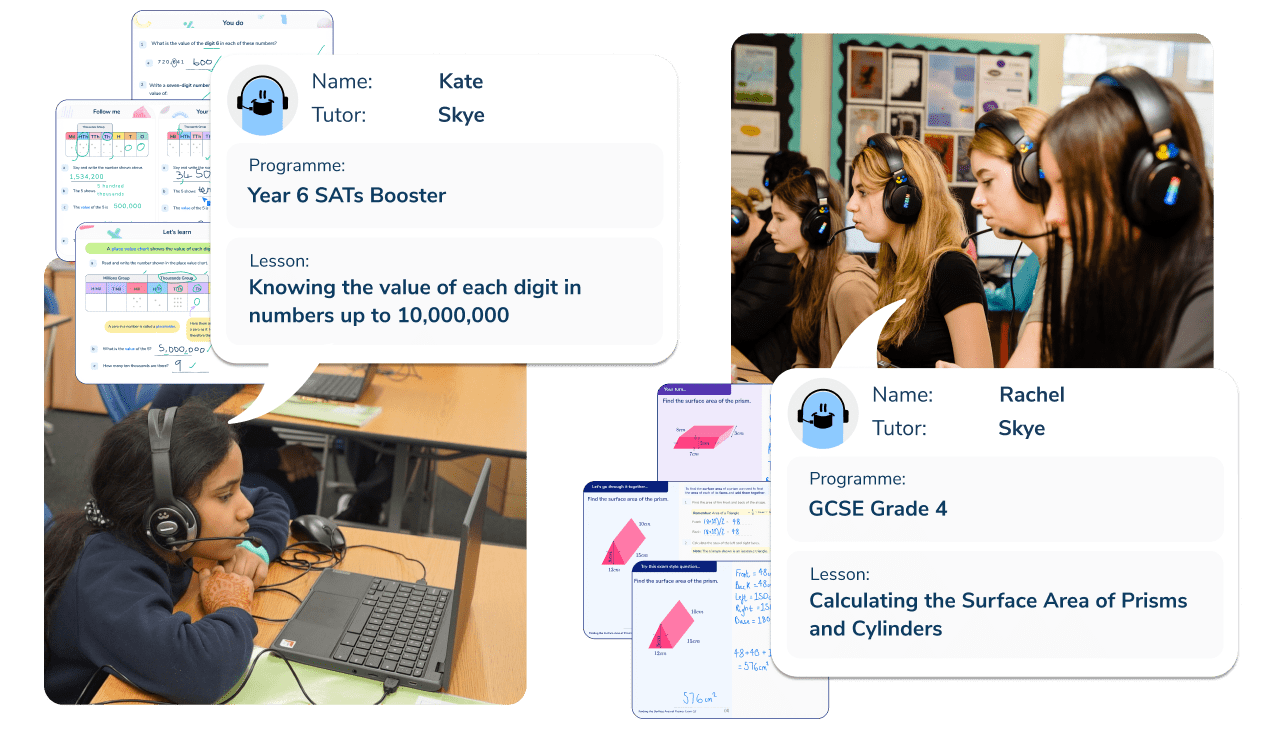
Meet Skye, the voice-based AI tutor making maths success possible for every student.
Built by teachers and maths experts, Skye uses the same pedagogy, curriculum and lesson structure as our traditional tutoring.
But, with more flexibility and a lower cost, schools can scale online maths tutoring to support every student who needs it.
Watch Skye in actionHow does Third Space Learning use praise?
At Third Space Learning, we’re in the lucky position that every pupil we teach is in a one-to-one environment. This means we can maximise each opportunity for praise and ensure each pupil feels rewarded throughout the moments that matter most.
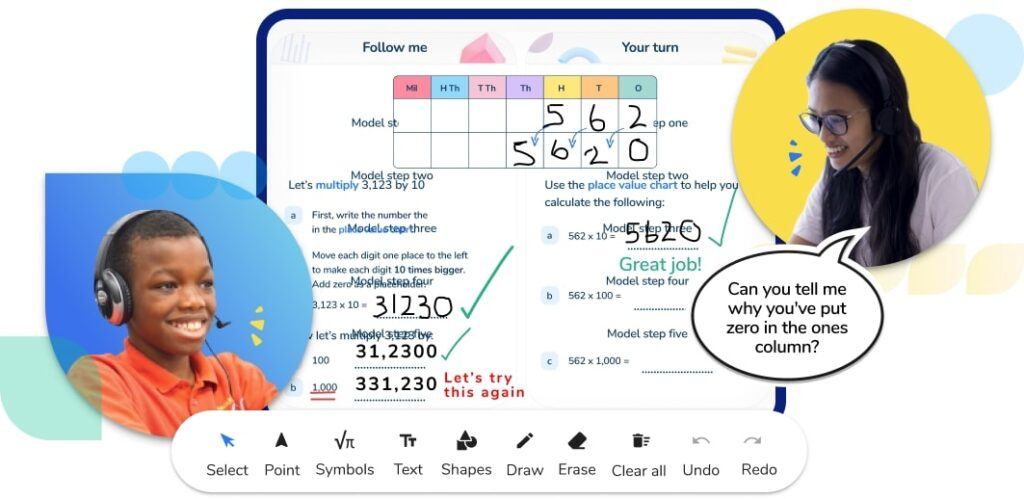
Sessions take place in our interactive classroom and pupils communicate with their tutor via a shared screen and audio connection. This enables tutors to listen to and watch each pupil’s learning carefully, and give pupils both verbal praise and on-screen rewards to keep pupils engaged in their learning.

2. Pupils need praise for more than just ‘getting it right’
Of course, we need to give pupils plenty of praise when they do reach the correct answer, but it shouldn’t be the only time pupils receive praise. As any good teacher will tell you, it’s important to praise pupils for their effort, not just when they reach the right answer.
Pupils need to feel that they’re in a safe space to try and, ultimately, make mistakes. They need to know that it’s important to give it a go, even if they don’t reach the right answer straight away. Even though they might not yet have mastered a mathematical concept, they’re reminded that they’re making progress towards that goal and feel rewarded by their teacher for doing so.
We talk a lot about encouraging a growth mindset, and praising your pupils for their effort in the classroom is one of the best ways to do so.
By rewarding both academic achievement and a positive maths mindset, your pupils will see that there’s value in trying; that there’s no such thing as someone who is ‘just not a maths person’, and that it’s not that they don’t get it, it’s just that they haven’t quite got there yet.
How does Third Space Learning use praise?
As the name suggests, the ‘effort points’ available to our tutors can be awarded to pupils when it’s felt they’ve tried hard to answer a question, even if they didn’t quite get it right.
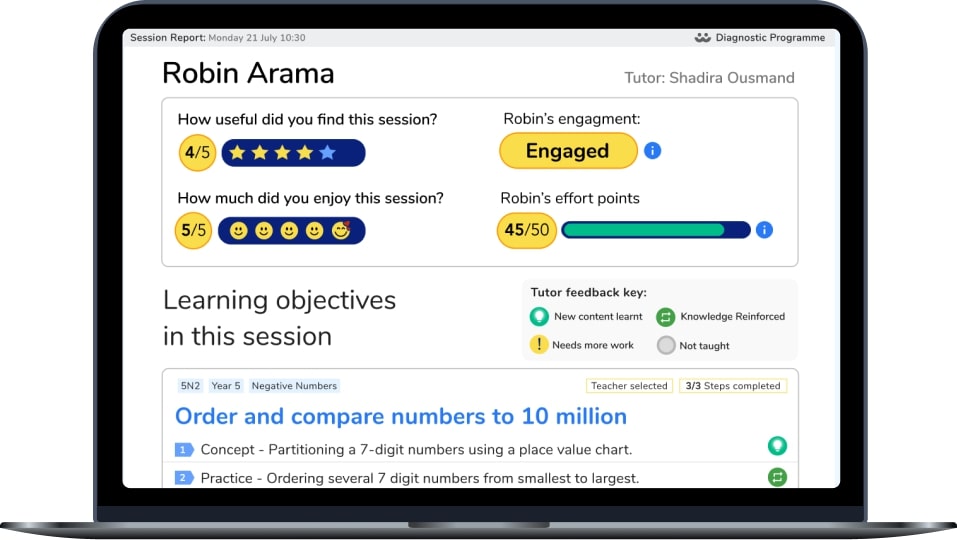
The more a pupil feels confident to attempt a question even when they’re not sure, the more time they’ll spend verbalising their maths reasoning with their tutor, and the more they’re likely to make sense of the concept they’re learning as they do, which means they’re then more likely to reach the right answer in the end. It’s a win-win!

3. Praise needs to be as specific as possible
Using specific praise (like our ‘effort points’ system) is a mechanism for giving timely feedback on successful strategies and approaches the pupil is using, whether that be in a one-to-one session or in the classroom.
Not only does this motivate the pupil, but it highlights the steps in the process of getting to the answer of a problem, rather than just the answer alone, which is essential to building pupils’ metacognition in the classroom.
How does Third Space Learning use praise?
We knew when we developed our online classroom that praise should be a key element in each pupil’s learning journey. While the ‘effort point’ system has been effective at helping build confidence and nurture a growth mindset in the classroom over the past 8 years, we felt we could do an even better job.
Our Teaching & Learning Team analysed thousands of hours of online one-to-one lessons and noticed that within the bundle of ‘effort’, pupils were in fact being praised for lots of different moments in their learning.
In the same way that saying to a pupil ‘well done, you’re so clever!’ (rather than ‘well done, you really persevered with that problem!’) doesn’t help them understand what behaviour is being rewarded, packaging everything under the term ‘effort’ might not help pupils to see the different steps they’ve taken to progress during their sessions.
That’s why, from September 2022, effort points will be replaced with 5 specific praise stickers.
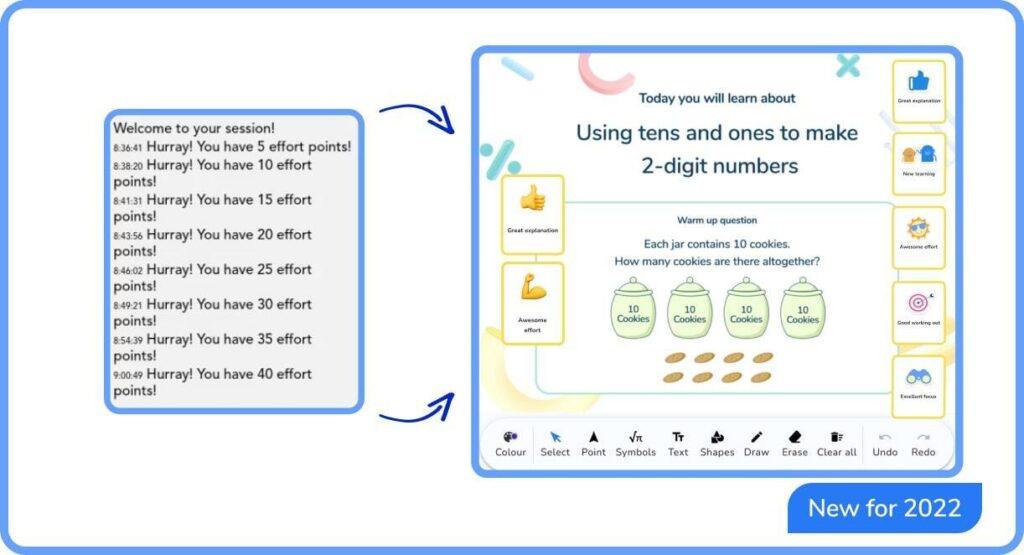
Tutors will be able to praise pupils for the following specific actions:
- Explanation of mathematical concepts
- Securing new concepts
- Showing their working out
- Focus on a particular problem
- And, of course, their effort!
This is something that’s easy to replicate in the classroom with just a few stickers or stamps, but it can be really effective at helping pupils to understand what behaviours are leading to them securing understanding and making progress in maths.

This feature is currently being tested by over 1,000 pupils each week ahead of a full launch in September 2022, and the feedback has been incredibly positive from pupils, schools and tutors.
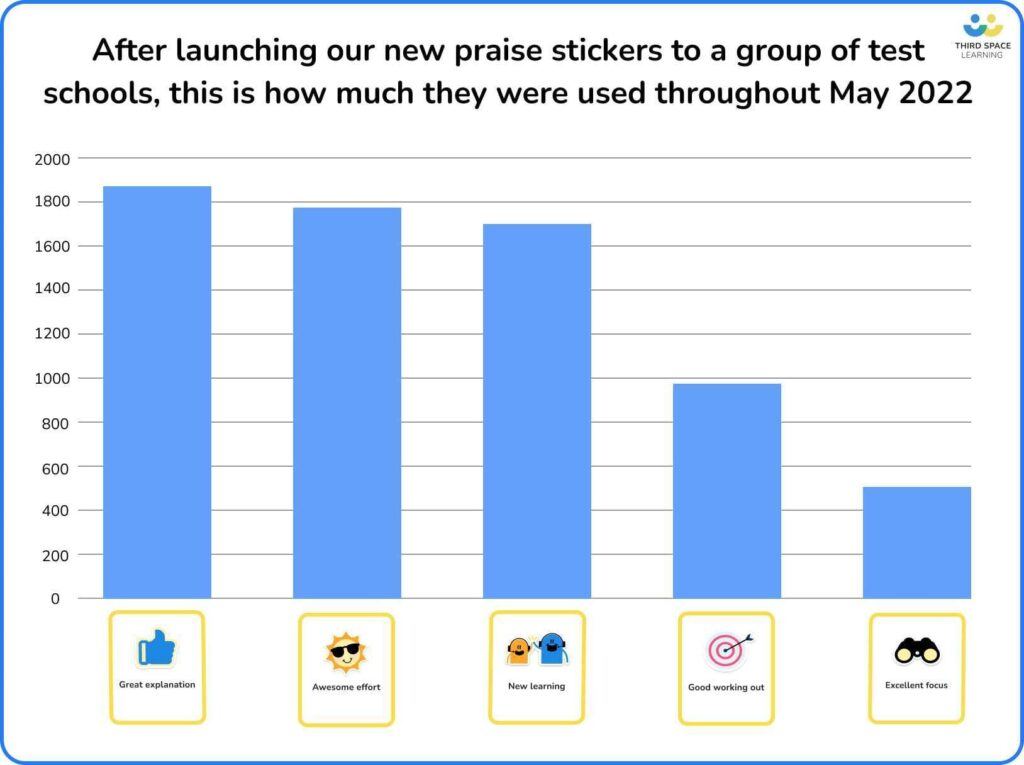
You can even see how frequently they’ve been used already!
What’s most exciting is that the top praise card so far is ‘Great explanation’, showing that pupils are using their verbal reasoning skills throughout sessions, which should continue to improve their confidence in their maths ability.
With maths, sometimes a pupil might just guess the answer or know a trick or ‘hack’ to work something out. If they’re encouraged to explain it back to you, then you know they’ve really understood and consolidated their learning.
But don’t just take our word for it, listen to this clip from our early pilot of the new tool, which shows just how motivated pupils can be by specific praise!
4. Praise and rewards need to consider intrinsic and extrinsic motivations
Primary pupils in particular are often motivated by extrinsic rewards; by actually receiving a reward, rather than just knowing they did a good job.
How does Third Space Learning use praise?
This was one of the reasons we originally implemented effort points.
Effort points were a valuable tool in helping us to build motivation among our pupils in this way, but we found that it also had another side effect; because tutors were able to give out effort points as they saw fit throughout the lesson, there wasn’t necessarily a standardised approach.
This meant that, when pupils excitedly discussed their sessions with their peers once they’d finished, some pupils had received more effort points than others, leading to some pupils feeling disappointed.
We’d successfully provided extrinsic motivation and helped pupils feel like they were working towards a reward, but we felt there was more room for improvement on the intrinsic motivation front. We wanted pupils to put 100% into their sessions because they felt proud of themselves for doing so, not just because they’re chasing a number of points to compare with their peers.

By moving from effort ‘points’ to specific praise stickers, we’ve been able to find a happy medium; pupils still receive that extrinsic reward (seeing the sticker on screen), but they also understand the specific behaviours that lead to these rewards and understand how it’s helping them on their learning journey.
In your own classroom, why not try a mix of intrinsic and extrinsic rewards. Foster a praise-rich environment that rewards pupils for specific positive behaviour factors with something tangible like stickers, stamps and certificates.
To help you along the way, download our free ‘Maths Superstar’ certificate to celebrate your pupils’ achievements. The perfect reward for pupils when they have learned a new concept or just tried really hard!
DO YOU HAVE STUDENTS WHO NEED MORE SUPPORT IN MATHS?
Skye – our AI maths tutor built by teachers – gives students personalised one-to-one lessons that address learning gaps and build confidence.
Since 2013 we’ve taught over 2 million hours of maths lessons to more than 170,000 students to help them become fluent, able mathematicians.
Explore our AI maths tutoring or find out about online maths tuition for your school.
